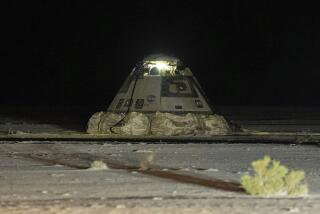Landing Delay Gives Shuttle Crew an Endurance Record
- Share via
KENNEDY SPACE CENTER, Fla. — Columbia and its astronauts set a space shuttle endurance record Friday--almost 18 days in orbit--after bad weather scuttled NASA’s landing plans for the second day in a row.
It was so foggy that the shuttle training aircraft, patrolling overhead for safety, had to land at a nearby Air Force base instead of at Kennedy Space Center.
The five astronauts were getting ready for bed--they’ve been working nights and sleeping days--when their mission surpassed the previous shuttle flight-duration mark of 16 days, 21 hours, 48 minutes and 30 seconds. Columbia set that record in July.
Mission Control piped up music from “2001: A Space Odyssey” to mark the occasion. Like most everything else on this mission, the music was late.
“We’re real interested in what you’re going to play us for an encore tomorrow night,” joked astronaut Story Musgrave.
Barring further trouble--and this mission has had its share--NASA expected to bring Columbia back this morning, if not in Florida then at Edwards Air Force Base in California. Gusty wind prevented an Edwards landing on Friday. Low clouds thwarted Thursday’s landing attempts at the Florida space center.
“We did not set out to break that endurance record,” said flight director Wayne Hale. “That’s the silver lining here on not being able to land when we wanted to.”
Columbia has enough fuel and supplies to stay up until Wednesday, Hale said. Crew fatigue is not an issue since a big chunk of the astronauts’ work was canceled--namely, two practice spacewalks that had to be scrapped because of a jammed hatch.
As for Columbia skipper Kenneth Cockrell’s ability to land a shuttle after such a long flight--astronauts sometimes become dizzy when re-exposed to gravity--NASA was not overly concerned. Doctors believe that pilots could spend more than 20 days in orbit and still be able to guide shuttles to a safe touchdown, Hale said.
Unfortunately, a computer software program that allows pilots to polish their landing skills in orbit stopped working earlier in the mission. “It’s not a mandatory thing,” Hale explained.
The twice-delayed homecoming gave the 61-year-old Musgrave one more record to bring home. Besides being on the longest shuttle flight, he is the oldest person ever in space, the first to fly six times on space shuttles and the first to fly on all five space shuttles.
“You make the most of every hand you get dealt,” Musgrave said.
More to Read
Sign up for Essential California
The most important California stories and recommendations in your inbox every morning.
You may occasionally receive promotional content from the Los Angeles Times.













